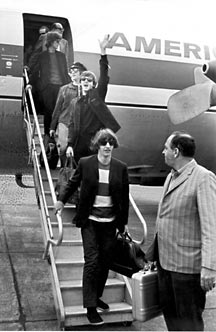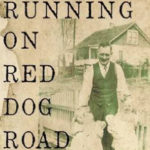Posted: 2/02/07
Beatles’ spiritual journey
followed long & winding road
By Bob Carlton
Religion News Service
WASHINGTON (RNS)—Rock music writer Steve Turner grew up in a Christian home in Daventry, England. Like other teenagers who came of age in the 1960s, Turner was a huge Beatles fan.
“At that time, Christians weren’t too keen on rock and roll music, so people in the church generally weren’t too keen on the Beatles,” Turner said. “Yet, after a few years, the Beatles became interested in religious topics, so there was this interplay between religion and rock music that I became interested in.”
Forty years after John Lennon made his infamous and often misunderstood comment that the Beatles were “more popular than Jesus”—spawning ban-the-Beatles protests—Turner explores the Fab Four’s spiritual quest in his latest book, The Gospel According to the Beatles.
 |
| Beatles (from top) George Harrison, John Lennon, Paul McCartney and Ringo Starr arrive in Portland, Ore., for a concert in 1965. |
The 57-year-old Turner first wrote about the Beatles in 1969, and has since written A Hard Day’s Write: The Stories Behind Every Beatles Song; The Man Called Cash: The Life, Love and Faith of an American Legend; and Trouble Man: The Life and Death of Marvin Gaye.
Although more than 1,000 books have been written about the Beatles, Turner says none has looked at their religious influences and insights as in-depth as his does.
The Beatles weren’t banned in Turner’s house when he was growing up—in fact, his parents bought him a copy of Beatles for Sale for Christmas in 1964—but they weren’t em-braced, either.
“I suppose my parents were like most parents at the time,” he recalled. “They thought their hair was too long, their heels were too high, their trousers were too tight and their music was too loud.”
Long before they became the Fab Four, though, each of the Beatles was influenced by religion—Paul McCartney and George
Harrison in the Roman Catholic Church and Lennon and Ringo Starr in the Church of England, Turner said. As he grew older, Turner embarked on a spiritual odyssey of his own, and he found inspiration in the music of the Beatles.
“They sort of validated the search for God, if you like,” he said. “For a long time, it seemed like rock music or pop music was almost like an alternative to religion.
“Religion seemed sort of dull and conformist, and rock and roll was sort of shiny and exciting, and the two didn’t seem to meet at all. Then when the Beatles started asking questions about meaning and singing songs like ‘Nowhere Man,’ they actually investigated religion.
“You had George Harrison quoting bits of the Bible—the kingdom of heaven is within, and things like that—and I was thinking, ‘Hmm, I think I’ve heard that before.’
“It seemed like the Beatles were suddenly on to something that you’ve been on to for a long time.”
“Nowhere Man,” which was off the Rubber Soul album, was “kind of the beginning of the (spiritual) quest” for the Beatles, Turner said.
“The music up until Rubber Soul had been sort of jaunty, I-love-you, you-love-me type of songs,” he said. “Then they started asking questions about the meaning of life, so you get ‘Nowhere Man,’ which is all about not having anything to believe in.
“Then there’s ‘Let It Be,’” he adds. “That has a reference to Mother Mary. Paul McCartney’s mother was called Mary, but he was aware that it had, I think he called it, a quasi-religious sort of gloss to the song.”
For the Beatles, and Turner, it was another step along a long and winding road.
“The Beatles were doing such great things,” he says. “I thought if you could absorb whatever the Beatles were absorbing, you could probably be as great as they were.”
Bob Carlton writes for The Birmingham News in Birming-ham, Ala.















We seek to connect God’s story and God’s people around the world. To learn more about God’s story, click here.
Send comments and feedback to Eric Black, our editor. For comments to be published, please specify “letter to the editor.” Maximum length for publication is 300 words.